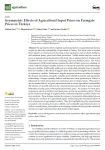Uzel G., Kuzu M., Güler A., Gürlük S. (2025). Asymmetric effects of agricultural input prices on farmgate prices in Türkiye. Agriculture, 02/03/2025, vol. 15, n. 6, p. 607.
https://doi.org/10.3390/agriculture15060607
https://doi.org/10.3390/agriculture15060607
| Titre : | Asymmetric effects of agricultural input prices on farmgate prices in Türkiye (2025) |
| Auteurs : | G. Uzel ; M. Kuzu ; A. Güler ; S. Gürlük |
| Type de document : | Article |
| Dans : | Agriculture (vol. 15, n. 6, March 2025) |
| Article en page(s) : | p. 607 |
| Langues : | Anglais |
| Langues du résumé : | Anglais |
| Catégories : |
Catégories principales 06 - AGRICULTURE. FORÊTS. PÊCHES ; 6.1 - Généralités. Situation AgricoleThésaurus IAMM MOYEN DE PRODUCTION AGRICOLE ; ENGRAIS ; COMBUSTIBLE ; PRIX ; COUT DE PRODUCTION ; DURABILITE ; TURQUIE |
| Résumé : | The asymmetric effects of global and national factors on agricultural production negatively affect the sustainability of agriculture in Turkey. This study seeks to explore those impacts on wheat prices by focusing on key input prices such as diesel, fertilizers, and substitute barley prices and wheat production. Unlike studies that use crude oil prices as agricultural input parameters, this study aims to address the lack of behavioural variables in time series studies by considering diesel and fertilizer prices. The Vector Autoregressive (VAR) model analysis examines the effect of barley prices as a substitute for wheat, while the Granger causality analysis is conducted to assess the causal relationships between variables. Additionally, unlike previous studies that primarily focus on causality between variables or the effects of lagged values, this study investigates the dual effects of explanatory variables. Furthermore, impulse response functions are utilized to analyse the dynamic interactions among the variables and to identify symmetric and asymmetric relationships. Granger causality analysis indicates that wheat production in Türkiye is influenced by wheat prices; however, production does not impact prices. Wheat prices are not market-driven, and price interventions aim to ensure agricultural sustainability. The absence of causality between the wheat production amount and its price emerged bilaterally as barley price/wheat production/barley price. An analysis of wheat price responses to shocks in fertilizer and diesel prices reveals an asymmetric pattern. Wheat prices reacted more strongly to negative shocks, while their response to positive shocks was more moderate. These findings indicate the existence of asymmetric relationships between wheat prices and these two agricultural inputs, underscoring the asymmetric nature of price transmission in agricultural markets. They also highlight the policy requirements associated with ensuring food price stability and sustainable agricultural practices as well as a crucial lesson: policymakers in developing countries should prioritize structural reforms over interventionist policies that distort market signals. |
| Cote : | En ligne |
| URL / DOI : | https://doi.org/10.3390/agriculture15060607 |







